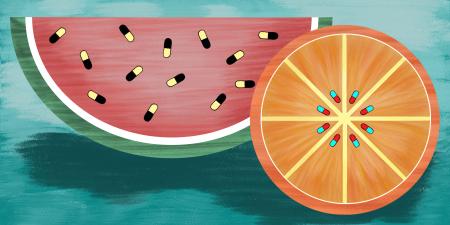Abstract
Diet is a universal influence on health and one of the major determinants of both years in life (longevity) and life in years (vitality). Diet is also a uniquely complex variable, encompassing nearly infinite variations in composition and concentration, making it difficult to study. Study design and the particular answers at which a given trial is aimed exert considerable influence on findings, and these, in turn, may be influenced by the biases and a priori preferences of researchers, funders, or commentators. To help patients access credible information and make informed lifestyle choices, clinicians must be able to do so themselves, yet the topic to date receives little attention in medical education. This commentary explores barriers to dietary counseling, strategies for improving medical education and clinical practice with respect to nutrition, and the ethical importance of sharing dietary information with patients.
The Importance of Nutrition and Its Absence from Medical Education
Diet is among the most universal and potent of influences on health. In modern societies where hyperprocessed foods prevail, food has undergone a truly dramatic transformation from essential sustenance into a—and perhaps the—single leading contributor to chronic disease and premature death.1,2 Considering the potency and ubiquity of dietary influences on health, all in “health care” are nothing less than duty bound to address this topic to the best of our ability.
Failure to address the contributions of food to health in the clinical context is an ethical lapse. That may seem startling, but it should not be. Surely it would be an ethical lapse to ignore the injurious effects of tobacco, alcohol, or illicit drugs when these are extant. Surely it would be an ethical lapse to neglect mention of relevant treatments for infection, pain, hypertension, or asthma. In just the same way, it is an ethical lapse to neglect the role of bad dietary choices in damaging health and the potential role of improved dietary choices in defending it.
Such considerations readily invite the questions: Why is diet not routinely addressed in both medical education and practice already, and what should be done about that?
Why the Failure to Address Diet in Clinical Practice?
The reason for the prevailing deficiency in medical education is a matter of history and failure to keep pace with changes in epidemiology. The basic structure of the medical school curriculum in 2018 still rests on the foundation of the Flexner Report compiled in 1920.3 At that time, diseases of nutritional deficiency still prevailed, and the modern diseases of dietary excesses were inconsequentially rare. Nutrition education was thus reasonably subsumed within biochemistry,4 a model that fails utterly today. Perhaps relegating the training of physicians to an educational model a century old is itself an ethical lapse? If so, we may hope the heir to Flexner is accordingly at work.
The neglect of diet in practice is not merely a matter of historical deficiencies in training, however. A full discussion of the many barriers to dietary counseling in clinical practice, beyond lack of content knowledge, is beyond the scope of this discussion.5 We may note readily, though, that diet is differentiated from other salient influences on health in important ways, some of which impede incorporation of dietary counseling into clinical practice.
Diet is a singularly complex variable to manage or to study. The addition of any given food, ingredient, or nutrient to a diet must either displace some other or add to the total quantity consumed. Either way, the intentional movement in one dietary variable causes ineluctable movement in another if not several or even many others,6 hindering the confident attribution of causal effects. Such attributions are thus often made on the basis of native bias and personal preference,7 at times directly tethered to personal gain—such as diet book sales—and so arises yet another ethical challenge.
Then there is the universal familiarity with diet that fosters contempt not for diet, of course, but for nutritional expertise.8 Physicians with no genuine expertise in, say, neurosurgery are neither likely to broadcast detailed opinions on that topic nor to have their “expert” opinions solicited by media. Most topical domains in medicine enjoy such respect: we defer expert opinion and commentary to actual experts. Not so nutrition, where the common knowledge that physicians are generally ill trained in this area is conjoined to routine invitations to physicians for their expert opinions on the matter. All too many are willing to provide theirs, absent any basis for actual expertise—such as specialty training in nutrition, published research in that area, or clinical experience in dietary counseling—and this, too, is an ethical lapse. In a culture that routinely fails to distinguish expertise from mere opinion or personal anecdote, we physicians should be doing all we can to establish relevant barriers to entry for expert opinion in this, as in all other matters of genuine medical significance.
Many other factors make diet a uniquely challenging topic for the clinician. Entire industries are devoted to marketing messages that may conspire directly against well-informed medical advice in this area. A food supply willfully engineered to maximize the calories required to feel full9 is directly at odds with admonishments about personal responsibility and portion control. Dietary patterns are products of culture as much as, or more than, individual preference. The choices anyone makes are always subordinate to the choices everyone has.10
Perhaps the greatest ethical imperative attached to diet is the impact it has on the environment at the scale of nearly 8 billion hungry Homo sapiens. Dietary patterns exert well-documented influences on aquifers, climate, and biodiversity.11 As there can be no healthy patients on a planet inhospitable to human habitation, the environmental impact of diet becomes an area of ethical obligation for the clinician. If two dietary patterns are comparably likely to promote patient health but one is decisively better for the planet, this fact bears—and perhaps should require—mention. Arguably, the profound ethical implications of diet for the treatment of species other than our own also warrant inclusion among matters medical.12
These, then, are some among the many ethical provocations attached to nutrition in clinical practice. What are some suitable responses?
How to Address Nutritional Counseling and Challenges to Healthy Eating in Medical Education and Clinical Practice
- Medical education must be brought up to date. For physicians to be ill trained in the very area most impactful on the rate of premature death at the population level13 is an absurd anachronism. All in medical education, at every level, have an ethical obligation to address this challenge. A 21st century answer to the Flexner Report would not be overreaching. In the interim, we should make optimal use of innovative models, such as culinary medicine, which are adaptable to both medical school14 and postgraduate15 settings.
- Physicians should treat nutrition like all other content areas in medicine and leave expert opinion to those with some valid claim to expertise: research, publications, dedicated training, recognition by expert peers, and so on. By policing ourselves accordingly, we physicians may help elevate the standards of expert nutrition opinion culture wide.
- Transparency in professional and funding relationships is essential. This is true whenever public opinion is propounded but is perhaps uniquely important for nutrition,7 if only because the subtleties of nutritional epidemiology can allow for questions to be posed in such a way that the answer is a foregone conclusion.16 Industry funding is an important factor here, but industry funding does not invalidate research per se; if it did, our pharmacy shelves would be empty.17 Rather, there are clear conflicts of interest in which a funder is seeking to generate evidence to obscure rather than reveal the truth, which should be avoided, and open reporting and transparency will help reveal these. An example would be beverage industry funding of research to highlight the role of exercise in energy balance. A pattern of research on behalf of a given funder with a given agenda will also convey important information. The reporting of funding affiliations will also help identify confluences of interest, reasonably distinct from conflicts.18,19 There are, perhaps, more definitive solutions to the challenges in this area, but these simple steps are a start.
- Nutrition must be addressed routinely in clinical practice. This effort can be advanced through reliance on registered dietitians and other nutrition experts as partners in a team approach. New tools may support this imperative as well.20
- The importance of dietary patterns to human health and the health of the planet should figure routinely in the patient-physician dialogue. A simple example would be discussions about the relative benefits—to health, the environment, the treatment of animals, and the costs of food—of less beef, more beans. The health of people and planet cannot reasonably be unbundled.
- The limits of nutrition research—and thus knowledge—should be understood and acknowledged by clinicians. This understanding, shared with patients and the public, should defend the fundamentals established on the basis of the weight of evidence21 and defend nutrition research and expertise against unjustified dogma or unsubstantiated personal opinion.
- Finally, there is an ethical requirement for clinical humility. Where nutrition contributes most to years in life (longevity) and life in years (vitality), it does so not as a result of rarefied clinical counseling but as a byproduct of the routines of culture.22 Physicians are ethically obligated to highlight cultural transgressions—such as the aggressive marketing of junk food to adults and children alike and manipulations of food formulations to promote overconsumption—that conspire against the crucial contributions of diet to health.23
The mission of medicine is to protect, defend, and advance the human condition. That mission cannot be fulfilled if diet is neglected. Diet has always been of fundamental importance to health; it is the fuel that runs every working element of the human machine, the one and only source of construction material for the growing body of a child. From essential sustenance, food has evolved—or devolved—into a modern scourge as well, playing a major role in the propagation of chronic disease and premature death. Diet may be the one domain where avowed “junk” is shamelessly peddled as such.
The challenges of restoring a salutary food supply, of making good choices accessible to all and empowering all people to recognize and make them, and of providing everyone the opportunity to love food that loves them—and the planet—back reverberate culture wide. The clinical setting cannot be held accountable for an influence only culture at large can wield. But clinicians can, and should, be held to ethical account for failure to lead reliably. Culture may be the shaft, but by the nature of our professional oaths, we are at the tip of the spear.
References
- Micha R, Peñalvo JL, Cudhea F, Imamura F, Rehm CD, Mozaffarian D. Association between dietary factors and mortality from heart disease, stroke, and type 2 diabetes in the United States. JAMA. 2017;317(9):912-924.
-
Bosely S. Diet is a factor in one in five deaths, global disease study reveals. Guardian. September 14, 2017. https://www.theguardian.com/society/2017/sep/14/poor-diet-is-a-factor-in-one-in-five-deaths-global-disease-study-reveals. Accessed April 27, 2018
- Duffy TP. The Flexner Report—100 years later. Yale J Biol Med. 2011;84(3):269-276.
-
Committee on Nutrition in Medical Education, National Research Council. Nutrition Education in US Medical Schools. Washington, DC: National Academy Press; 1985.
- Kolasa KM, Rickett K. Barriers to providing nutrition counseling cited by physicians: a survey of primary care practitioners. Nutr Clin Pract. 2010;25(5):502-509.
-
Katz DL. Food and diet, pebble and pond. US News & World Report. May 6, 2013. https://health.usnews.com/health-news/blogs/eat-run/2013/05/06/health-hinges-on-the-whole-diet-not-just-one-food. Accessed April 27, 2018.
- Ioannidis JPA, Trepanowski JF. Disclosures in nutrition research: why it is different. JAMA. 2018;319(6):547-548.
-
Nichols T. The death of expertise. Federalist. January 17, 2014. http://thefederalist.com/2014/01/17/the-death-of-expertise. Accessed April 27, 2018.
-
Moss M. The extraordinary science of addictive junk food. New York Times Magazine. February 20, 2013. https://www.nytimes.com/2013/02/24/magazine/the-extraordinary-science-of-junk-food.html. Accessed April 27, 2018.
-
Thaler RH, Sunstein CR. Nudge: Improving Decisions about Health, Wealth, and Happiness. New York, NY: Penguin Books; 2009.
-
Godoy M, Aubrey A. Chew on this for Earth Day: how our diets impact the planet. NPR. April 22, 2017. https://www.npr.org/sections/thesalt/2017/04/22/525113726/chew-on-this-for-earth-day-how-our-diets-impact-the-planet. Accessed April 27, 2018.
-
Katz DL. How bad, really, is red meat? WBUR. September 28, 2016. http://www.wbur.org/hereandnow/2016/09/28/red-meat. Accessed April 27, 2018.
- Aggarwal M, Devries S, Freeman AM, et al. The deficit of nutrition education of physicians. Am J Med. 2018;131(4):339-345.
-
La Puma J. What is culinary medicine and what does it do? Popul Health Manag. 2016;19(1):1-3.
- Polak R, Phillips EM, Nordgren J, et al. Health-related culinary education: a summary of representative emerging programs for health professionals and patients. Glob Adv Health Med. 2016;5(1):61-68.
- Barnard ND, Willett WC, Ding EL. The misuse of meta-analysis in nutrition research. JAMA. 2017;318(15):1435-1436.
-
Katz DL. A world without pharmacies. HuffPost. December 10, 2015. https://www.huffingtonpost.com/david-katz-md/a-world-with-no-pharmacie_b_8763456.html. Updated December 9, 2016. Accessed April 27, 2018.
- Cappola AR, FitzGerald GA. Confluence, not conflict of interest: name change necessary. JAMA. 2015;314(17):1791-1792.
-
Katz DL. Industry funded research: conflict or confluence? HuffPost. August 20, 2015. https://www.huffingtonpost.com/david-katz-md/industry-funded-research_b_8016628.html. Updated August 20, 2016. Accessed April 27, 2018.
-
DQPN (Diet Quality Photo Navigation) website. https://www.dqpn.io/. Accessed April 27, 2018.
-
True Health Initiative website. http://www.truehealthinitiative.org. Accessed April 27, 2018.
-
Buettner D. The Blue Zones: Lessons for Living Longer from the People Who’ve Lived the Longest. Washington, DC: National Geographic Society; 2010.
Google Scholar -
Jacobs A, Richtel M. How big business got Brazil hooked on junk food. New York Times. September 16, 2017. https://www.nytimes.com/interactive/2017/09/16/health/brazil-obesity-nestle.html. Accessed April 27, 2018.



